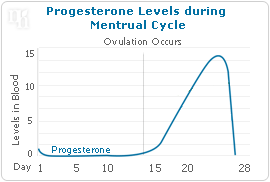Menopause can be a distressing time in a woman's life. She has to contend with impending infertility and, worst and most feared of all, the loathed menopause symptoms. These afflictions can cause symptoms ranging from night sweats and mood swings to hot flashes. When menopause symptoms strike, it can seem like there is no way out. However, with the right knowledge, there are ways to combat all of these symptoms. Keep reading to learn how to fight your menopause symptoms by addressing the root of the problem, hormonal imbalance, and boosting your progesterone levels.
Progesterone: A Brief Introduction

Progesterone is a natural hormone found in the human body. You may not realize it, but this little chemical is a vital cog in your body. As with all hormones, progesterone works like a chemical messenger. Progesterone helps to control functions like the menstrual cycle by letting the body know when to prepare the uterus for a fertilized egg.
To function correctly, progesterone levels must be in balance with the other hormones in the body. However, during menopause, progesterone levels often drop, causing an imbalance that results in menopause symptoms. The only way to combat this is by boosting your progesterone levels. Keep reading to learn how to boost your progesterone levels.
Boosting Progesterone Levels
It's important to keep your levels of progesterone balanced, otherwise you will face a number of physical and emotional consequences. Menopause symptoms caused by low levels of progesterone include headaches, irregular periods, fatigue, night sweats, hot flashes, mood swings, breast tenderness, and anxiety. Low progesterone levels can even result in breast cancer, gum disease, and brittle nails.

Luckily, there are ways to boost your low progesterone levels. Many of these methods are easy to incorporate into your daily routine. If you're trying to boost your progesterone levels, you should start by improving your diet. Diet is vital in the battle against menopause symptoms and should be taken very seriously. A good diet consists of plenty of vitamins and proper hydration. It is also important to exercise regularly; exercise can help to boost the body's immune system and make it less susceptible to the effects of menopause symptoms. If these steps don't minimize the effects of menopausal symptoms then it may be advisable to try other methods including herbal remedies or hormone replacement therapy (HRT). However, it is important to consult a healthcare professional before utilizing either of these methods.
If you want to learn more, follow this link leading to ways of controlling progesterone imbalance.


